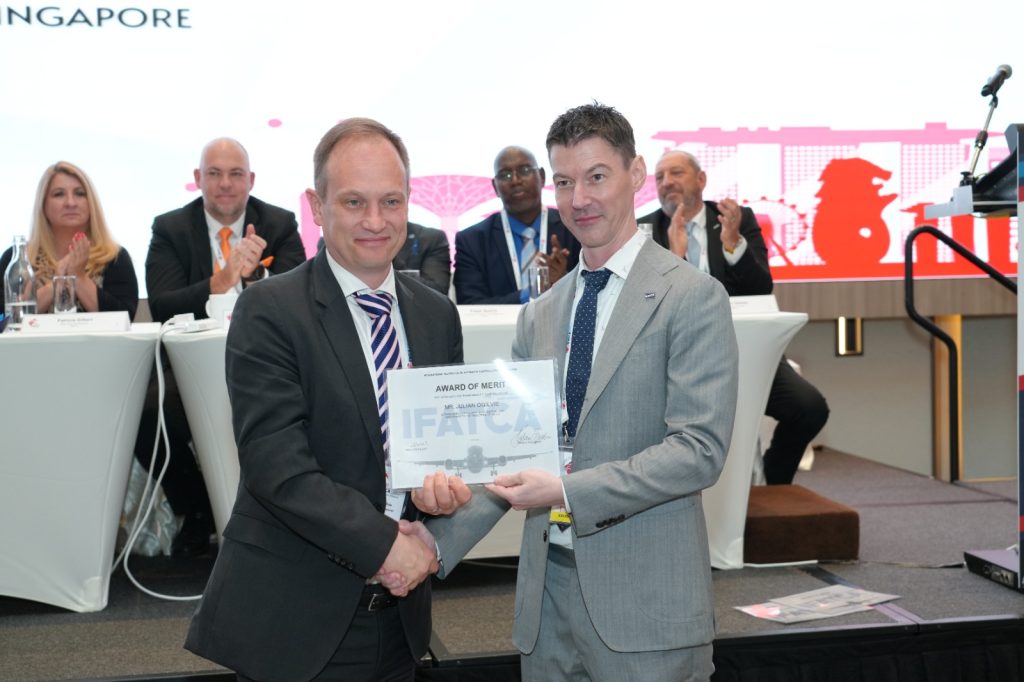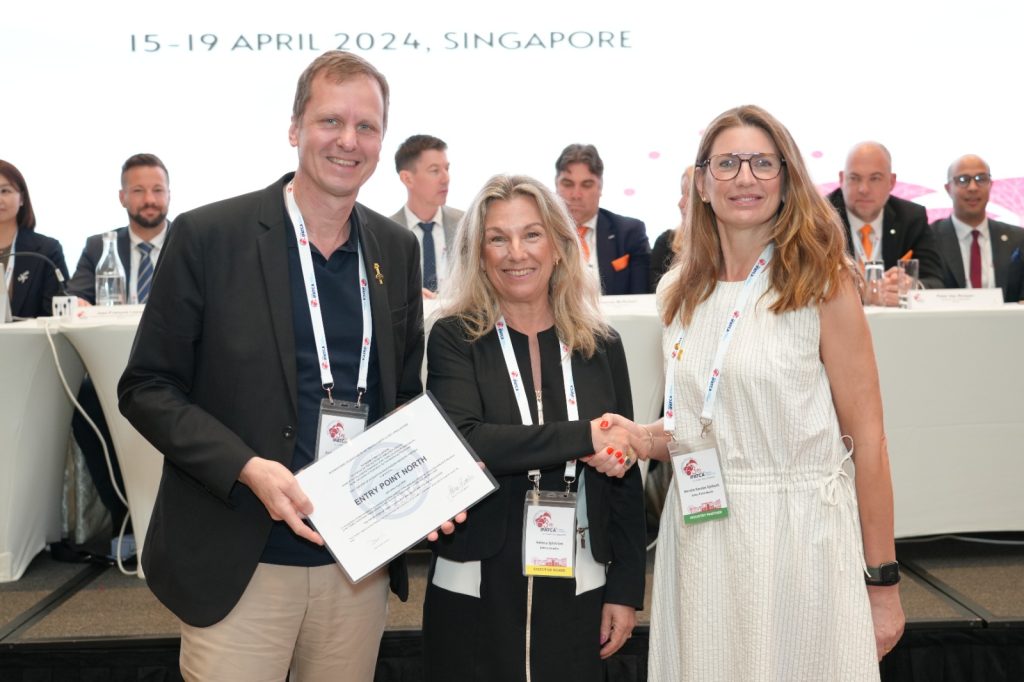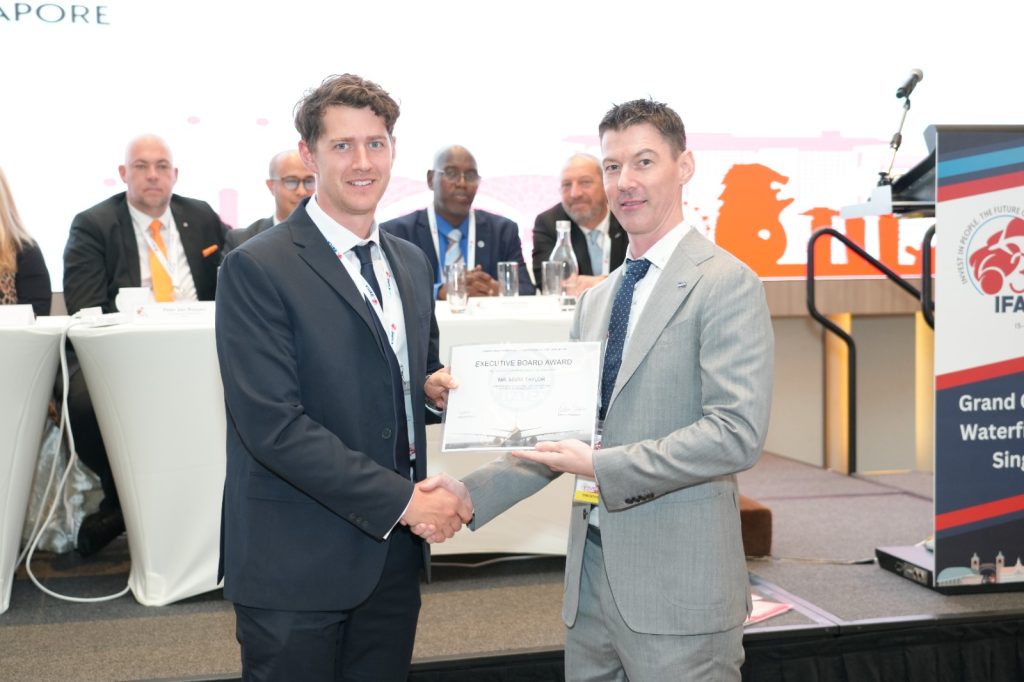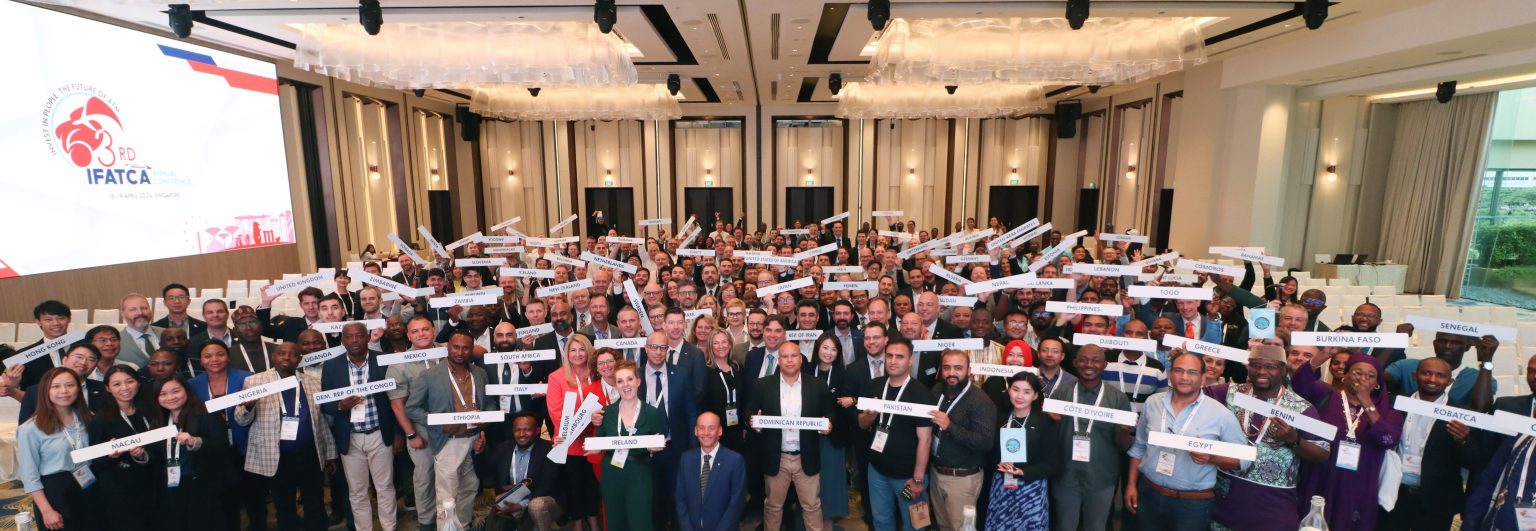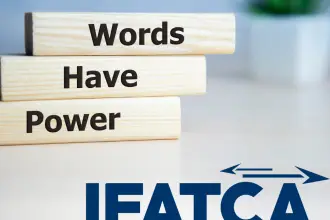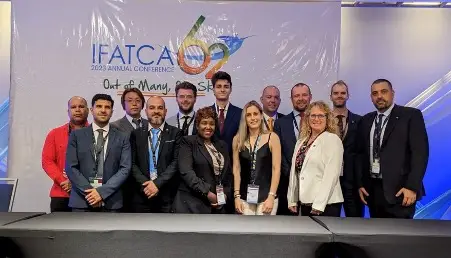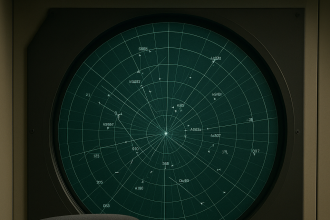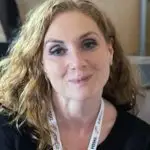
by Nicola Nì Rìada
IFATCA Communications CoordinatorFollowing the opening plenary during our annual conference, delegates divide themselves into three committees, which discuss specific topics before making recommendations to the final plenary. During the 63rd Annual Conference in Singapore in 2024, Committee A sessions were chaired by Julian Ogilvie (Switzerland, Helvetica) and co-chaired by Ramon Amora (Dominican Republic). Committee A deals with all the Federation’s constitutional and administrative topics. Committee B, dealing with all the technical and operational topics, was chaired by Alexander Schwassmann (Germany) with Olivia May (GATCO UK) as co-chair. Committee C debated professional and legal topics and was chaired by Sten Verpalen, (Netherlands) and Nyamgerel Dashdolgor (Mongolia). Professional and technical topics often overlap and for these, a shared session of committees B and C is held.
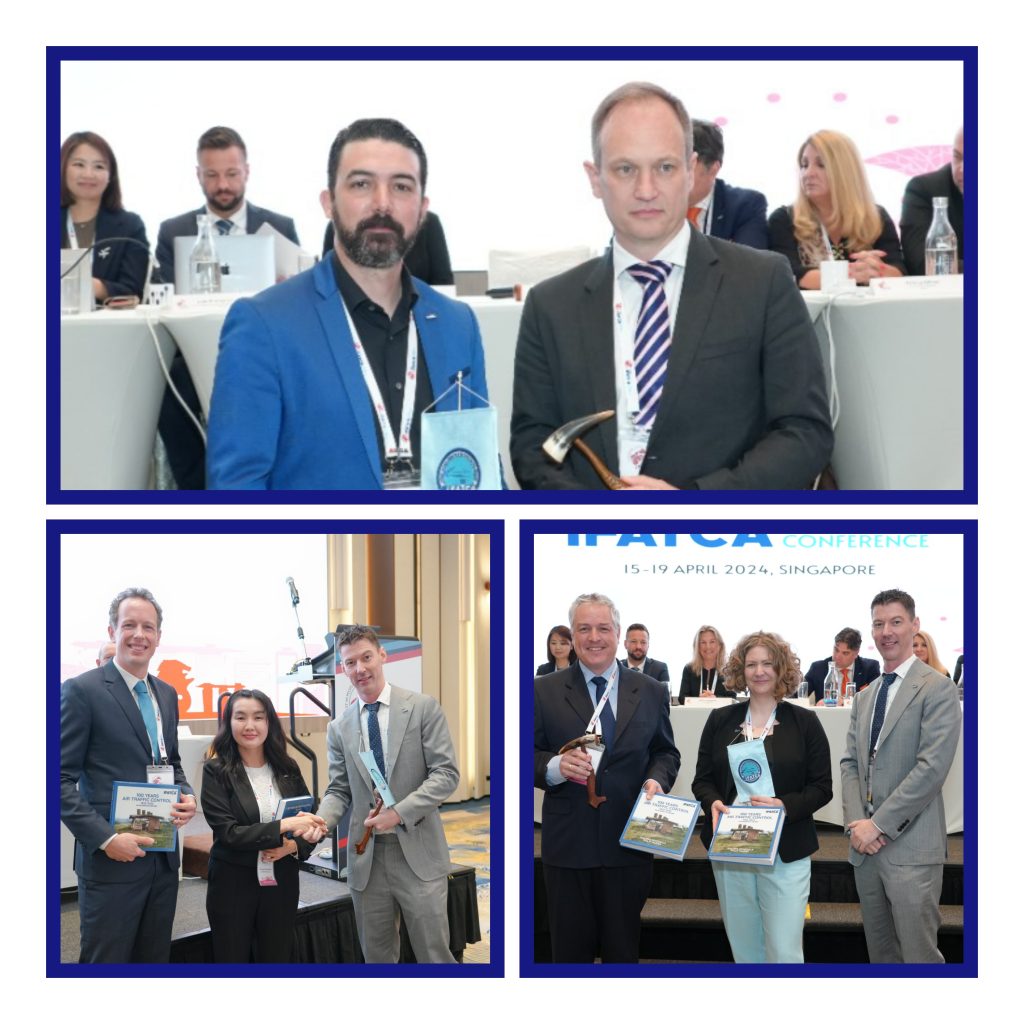
The chairs and co-chairs ensure each committee runs smoothly and promptly, even with their full agendas. Member Associations have the chance to review working papers before the conference, and delegates are generally well-briefed and ready to engage in discussion. Each committee room also has Executive Board members present to assist them with points of order, moderate the discussion, and ask for expert opinions. At the final plenary, each committee chair delivers a synopsis of the proceedings, the gist of which you will find below.
Administrative Matters
Committee A is the Federation’s “engine room,” and to ensure its smooth and efficient operation, it requires maintenance. Albert Einstein said, “Life is like riding a bicycle; to keep your balance, you must keep moving.”
Committee A welcomed reports from IFATCA Officers to the conference. The amount of work the team carried out on our behalf is considerable. IFATCA Officers have demonstrated high professionalism and competence and affirmed the Federation as an important stakeholder in the international aviation community. Particularly encouraging was the request from ICAO to the Chair of the EDI task force to participate in discussions regarding Equality at the highest level in Montreal. Industry partners BayMac, Frequentis, Thales, L3Harris, FTE Jerez and Entry Point North attended our meeting, with Baymac giving an excellent presentation.
It has been especially encouraging to see the democratic process in action, with participation from all those present despite the high number of newcomers. Elections of volunteers to contested seats, such as that of EVP AFM this year, will succeed for one and fail for another. This process, however, reaffirms people’s energy for the Federation and should be applauded.
The standing committee Finance (FIC), once again under the leadership of Daniel Nartey, Ghana, and the supervision of the EVPF, Tom McRobert, produced nine work items, ranging from reviewing EB honoraria, classes of air travel, membership subscription rates, and charging mechanisms. The requirement of IFATCA to keep a balanced budget generated significant, constructive debate and will lead to a work item for the following year.
FIC proved popular and the three positions available for the forthcoming year were filled quickly: the USA, Dominican Republic and India will participate, with Kenya, Zambia and Indonesia contributing as corresponding members.
The constitutional and administrative committee (CAC), under the efficient and knowledgeable leadership of Rob Mason, Australia, produced nine work items of a high standard. These ranged from evaluating the duration of the annual conference to establishing and disestablishing task forces and member association affiliation processes. This last paper prompted debate and will lead to a work-study for the forthcoming year. The review of working paper submission dates was a response to last year’s concerns from Member Associations.
Seeing Rob Mason continue in his position for another two years was encouraging. The constitutional standing committee also proved popular, and Canada, Ghana, and Uganda filled the three positions available for the forthcoming year. Kenya, Trinidad and Tobago, and Algeria will participate as corresponding members.
As a first for Committee A, a task force presented work items for the committee to consider. The theme was to create papers from which projects could be launched. The concept of Regional Committees was created, and guidelines for their management will be made available to the regions. The original paper generated significant discussion, and valuable concerns were raised. As a result of these concerns, a drafting group was formed, and a consensus was achieved after meaningful evaluation. Another paper has brought about a separate task force that will be created to manage creating and implementing a new web platform. Guidelines for the organisation of Regional Meetings have also been defined.
Committee A also elected several members of the Executive Board: Ms. Helena Sjöström (Sweden) succeeds Duncan Auld (Australia) as President and CEO. Mr. Jean-François Lepage (Canada) fills Helena’s former post of Deputy President.
Mr. Peter van Rooyen (South Africa) continues for another term as Executive Vice-President Professional. After a year in an acting role, Mr. Thomas McRobert (Australia) was confirmed as Executive Vice-President Finance. Mr. Ahmad Abba (Nigeria) replaces Mr. Fateh Bekti (Algeria) as Executive Vice-President Africa Middle East.
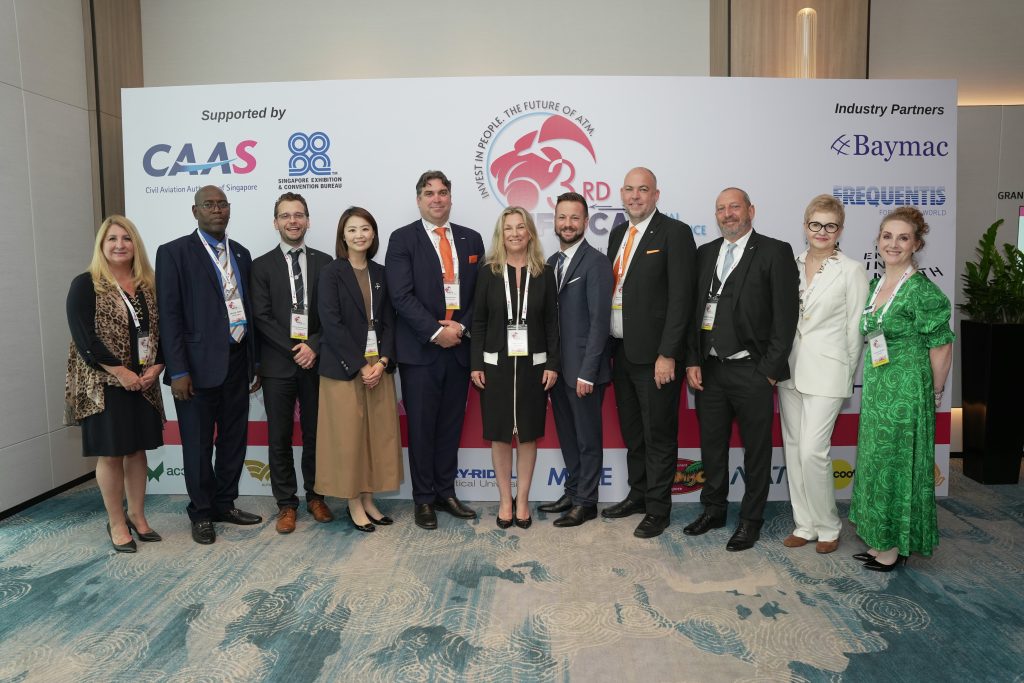
Technical & Professional Overlap
The combined B & C committees conducted their business with an impressive 63 Member Associations, 25 proxies, and representatives from ICAO, IFALPA, IFISA, and APLA Singapore in attendance. The attendance of these organizations shows that the outside world appreciates our work and that we are a respected organization. Industry partners BayMac, Frequentis, Thales, L3Harris, FTE Jerez, and Entry Point North attended our meeting. Frequentis and Thales gave excellent presentations.
The packed agenda kicked off with many reports by the various representatives to ICAO, introduced by Jean-Francois Lepage as Liaison Officer to the ICAO Air Navigation Committee. Paul Neering, Liaison Officer to the European Union, was here for his last conference and presented the work done on a European level on behalf of all IFATCA representatives. Eugenio Diotalevi (Italy) gave a comprehensive overview of the work of the RPAS task force and surveyed the controllers present. He can confidently be called an expert on the matter, as is the case for Katariina Syvays (Finland) regarding remote towers. PLC and TOC presented several work studies connected to these subjects, such as a paper on interactions between RPAS and ATC and a review of the automation policy. Both papers proposed new policy or amended existing policy to strengthen our position on the subjects.
A special mention to our colleague and subject matter expert, Stathis Malakis (Greece). He shared his views on the Joint Cognitive Human-Machine System, making a subject with a very complicated name easy to understand.
In the professional domain, the Training Task Force, led by JF Lepage and incoming chair Ben Kings, and the Well Being Taskforce, under the lead of Jaco van der Westhuizen (South Africa), made sure their voices were heard and their work was made aware to the conference. Both task forces are relatively new and can profit from more involvement by MAs.
The paper on system-based ATC licensing, initially quite a philosophical concept, was tabled during the meeting because the discussion proved that actual initiatives are happening worldwide. A drafting group was formed, and a provisional policy was accepted in which IFATCA’s position was clarified, and tasking ourselves to continue the work.
The Committees then accepted the report of Kimmo Koivula (Finland), the IFATCA representative to the IFALPA ATS Committee. Kimmo has served for many years as a representative to our sister organization, the pilots we speak to daily but do not often get to engage with fully.
Work in the committee thereafter mainly focused on the complexity of VFR and Special VFR flights regarding workload for ATCOs. New draft policy statements prepared by the Technical and Operations Committee and the Professional and Legal Committee were accepted. A special mention must go to ANACNA, our Italian MA, for conducting an interesting study that was the basis for one of the working papers. Research is the groundwork of all work studies in IFATCA, and we are very happy that, thanks to Jean Francois Lepage, we will have guidelines to prevent plagiarism and copyright infringements for all IFATCA officers.
Technical & Operational Issues
Committee B was exceptionally well attended, with 58 Member Associations holding 27 proxies and representatives from ICAO, L3Harris and IFISA. This might have been the biggest attendance in any Committee B for the last 20 years.
Over a single day, the Committee received reports from IFATCA officials and representatives to ICAO and debated on an impressive number of working papers prepared by the Technical and Operations Committee (TOC). Topics discussed ranged from Trajectory Based Operations to (once again) RPAS and Space Based Surveillance and Communications. The Committee accepted thirteen reports and discussed six working papers drafted by TOC. One was accepted as an information paper. The policy was amended on the following subjects: 5-Letter Waypoint Coding, Multiple Remote TWR Operations (now designated Digital Air Traffic Services or DATS by ICAO), UAS Flight Rules, FF-ICE Flight Plans and Responsibility for Terrain and Obstacle Clearance. The continued work of the IFATCA representatives to ICAO under the outstanding guidance of our outgoing Liaison Officer, Mr. Jean-François Lepage, as well as the members of TOC, led by their Chair, Ms. Jaymi Steinberg, was once again a testament to the high standard of knowledge and professionalism that makes IFATCA an important and universally respected player on the global stage of civil aviation.
Having seen the dedicated TOC members successfully defend their papers on stage, 15 member associations indicated their willingness to step into their shoes for 2024/25, but only nine places were available. Sincere thanks go out to the MAs who were unsuccessful on this occasion. TOC once more has member associations from all four IFATCA regions, and I would like to stress that even though the manual does have a procedure to ensure places on TOC for at least one member association from every region, even if they did not get the required number of votes, on this occasion this rule did not have to be invoked.
Professional & Legal Matters
Committee C this year was very well attended by delegates and observers, with proceedings taking place relaxed yet professionally. It was a pleasure to see a high level of discussion between the delegates on a wide range of topics. Many newcomers were not reluctant to speak up.
With Adam Exley from the UK as chair this year for the first time, PLC once again presented high-quality working papers. A total of six work studies were presented in Committee C, most containing recommendations to add, amend, or delete IFATCA policy. A special mention to those presenting for the first time: Olga Toki (Greece), Kurt Solomon (Jamaica), and Naoto Ishii (Japan).
PLC examined the deactivation of safety nets and introduced new definitions to the technical Professional manual (TPM) as a first step. A review of the policy will follow next year. Our existing policy on Work and Rest schemes was expanded after a good discussion. There is no one-fits-all solution, as every unit has its own specificities. But the new policy allows a better balance between individual health and social life, and work/safety performance.
It was proposed to delete the policy on warnings for unsafe airspace/aerodromes, as this is the responsibility of states and ANSPs. Added to our Technical & Professional Manual (TPM) was the definition of an ATCO, which was requested and welcomed particularly by states from the African region to raise awareness and the status of our profession. The existing policy on simultaneous training on adjacent positions was expanded to reflect current operations in member states. A comprehensive paper on confusion with leased aircraft markings and callsigns brought a common issue to our attention.
All delegates present were challenged by probably the biggest work study presented at a conference in terms of the number of recommendations. PLC conducted a full review on the IFATCA Training Policy, which originated in 2007. 39 draft recommendations were discussed and voted on efficiently. A big thank you to the delegates for being practical and thorough at the same time. And to Jonne van Schaik (The Netherlands), who was on the stage for most of the afternoon, staying sharp as a sniper.
Also worth mentioning is David Perks (Australia), the former chair of the PLC. He was not present at this conference but acted as a special advisor to the PLC in the past year. Liraz Alfassi (Israel) was appointed in this role for next year.
A record seventeen MAs showed interest in joining PLC as elected members for only twelve places. After the election, the USA offered up its position and became a corresponding member in favour of Jamaica as the next MA in line from the region.
All the chairs and co-chairs expressed their sincere thanks to the Organising Committee under Mr. Lim De Wei, to Conference Coordinator Mr. Jez Pigden, to office manager Ms. Tatiana Iavorskaia, and last but certainly not least, to the Delegates of Committees A, B and C, for conducting our business in an efficient, swift and respectful manner. Irrespective of the number of interventions, each member attending provided invaluable support. You are the Federation!
Final Plenary
The Final Plenary session convenes upon the completion of the tasks undertaken by committees A, B, and C. Directors vote on endorsing committee decisions, officiating new member associations, ratifying executive board member elections, and acknowledging Federation volunteers. During this conference, special recognition was given to Duncan Auld, the outgoing PCX, who was awarded the prestigious IFATCA Scroll of Honour for his exceptional service and leadership. Additionally, Jules Ogilvie and Paul Neering were honoured with the IFATCA Award of Merit for their significant volunteer contributions. Fateh Bekhti, the outgoing EVP AFM, Alfred Vlasek (Austria), Djamel Abdelmalek (Algeria) and Mark Taylor, former EVP Finance, received the distinguished Executive Board Award, while Industry Partners L3Harris and Entry Point North were granted Charters of Affiliation as Industry Partners.
